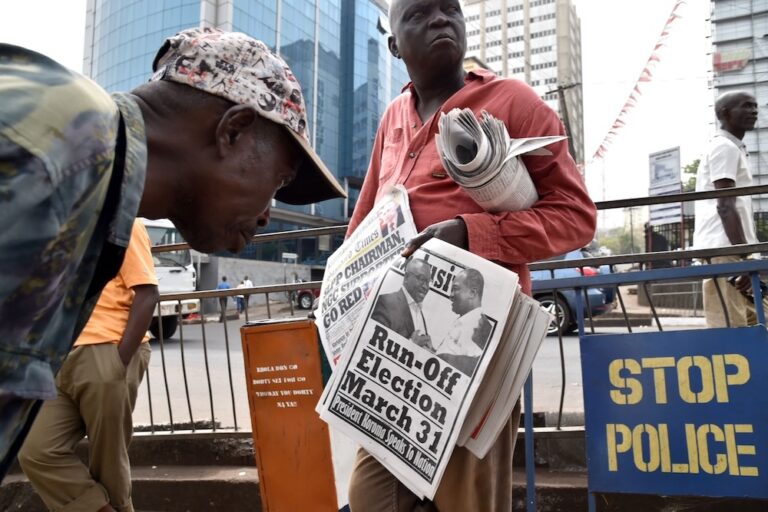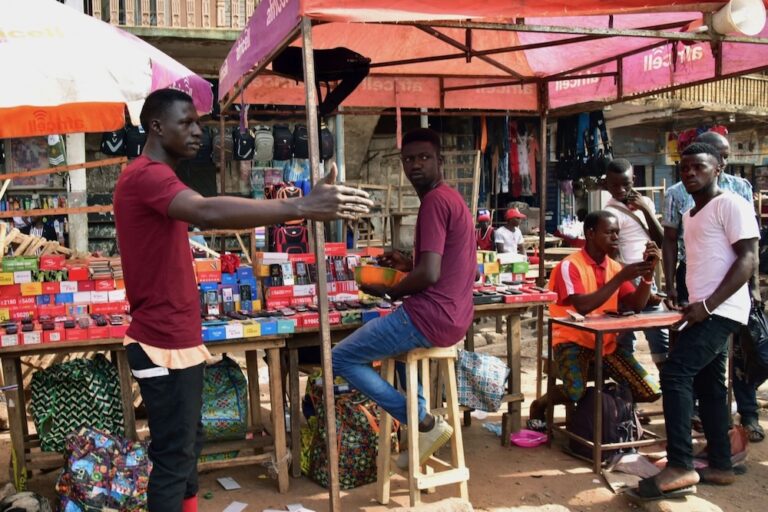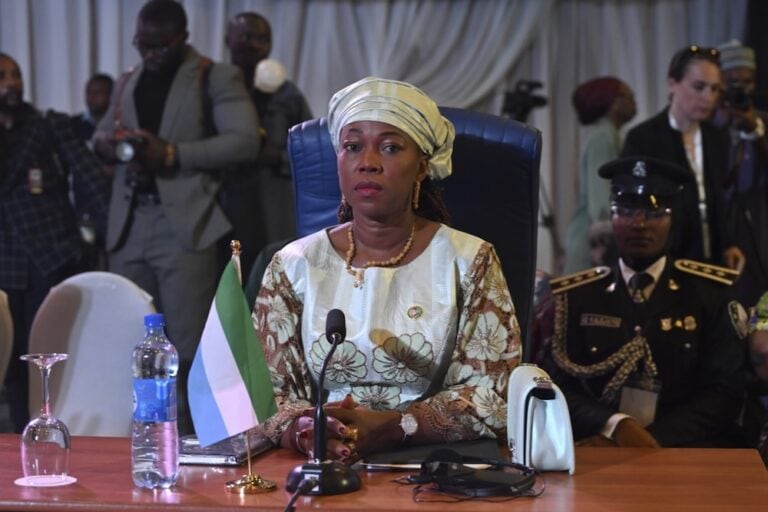(ARTICLE 19/IFEX) – The following is a ARTICLE 19 press release calling on all parties to the civil war in Sierra Leone to respect international human rights principles in relation to journalists reporting the conflict: **Updates IFEX alerts of 11 January and 6 January 1999** 12 January 1999 – for immediate release Sierra Leone – […]
(ARTICLE 19/IFEX) – The following is a ARTICLE 19 press release calling on
all parties to the civil war in Sierra Leone to respect international human
rights principles in relation to journalists reporting the conflict:
**Updates IFEX alerts of 11 January and 6 January 1999**
12 January 1999 – for immediate release
Sierra Leone – ARTICLE 19 calls on warring parties not to target
journalists, urges that “truth” must be part of peace efforts
ARTICLE 19 today responded to the news of the tragic death of Associated
Press Television cameraman Myles Tierney at the hands of the rebel
Revolutionary United Front (RUF) in Freetown on 10 January by calling on all
parties to the civil war in Sierra Leone to respect international
humanitarian and human rights principles in relation to local and foreign
journalists reporting the conflict.
Malcolm Smart, Acting Director of ARTICLE 19, said:
“Myles Tierney’s death reminds us of the courage displayed by both local and
foreign reporters as they seek to bring us the truth about what is happening
in war zones around the world. We condemn this brutal act by RUF fighters.
Journalists are a prime target for repression and violence by both
governments and rebels in such situations. We call on all sides in Sierra
Leone to respect the efforts of journalists, in the most difficult of
circumstances, to engage in their legitimate professional activities.”
He added:
“Truth is invariably a casualty of war. There is a danger it may also be a
casualty of peace. Even as the fighting rages on, efforts to find a way out
of the conflict are continuing – as they must. There has been some talk of
reviving the 1996 Abidjan peace accord by the beleagured
democratically-elected government of President Tejan Kabbah – an accord
which the RUF reneged on last time around. The Abidjan peace accord gave a
blanket amnesty to all RUF leaders and fighters for human rights violations
committed in the fighting. Its resurrection would presumably involve a
renewal of the amnesty offer.
“The past eleven months since the restoration to power of President Tejan
Kabbah in February 1998 has seen a confused approach to crucial issues of
justice and reconciliation. On the one hand, Foday Sankoh, the leader of the
RUF, has been brought to trial and sentenced to death for treason. On the
other, an amnesty was later offered to other RUF leaders, including their
current commander Sam Bockarie, if the rebels laid down their arms. At the
same time, significant numbers of civilians have been sentenced to death for
treason for acts which in some cases seemed to amount at most to
‘collaboration’. “
He concluded:
“It is difficult to imagine how a lasting peace can be built in Sierra Leone
if a peace settlement merely replaces the confusion of recent months with
institutionalised amnesia. There needs to be an honest reckoning with the
horrifying human rights abuses, past and present.”
In a memorandum to the Sierra Leone Government and international community
in September 1998, ARTICLE 19 argued that greater support for “truth
processes” – perhaps even a Truth Commission – might assist the search for a
constructive and consistent approach to issues of justice and reconciliation
(1). The organization says that present diplomatic efforts – including those
of the Sierra Leone Contact Group, in which the UK plays a leading role and
which is due to meet next at the end of January in New York (2) – to end the
civil war must give issues of “truth” urgent attention. ARTICLE 19 also
calls for provisions for blanket impunity in the Abidjan peace accord to be
reviewed if it is to be a basis for peace efforts.
1 Strengthening the right to freedom of expression in Sierra Leone: ARTICLE
19’s recommendations for action by the government of Sierra Leone and the
international community (London, 3 September 1998). Copies of this
memorandum are available from ARTICLE 19.
2 The Sierra Leone Contact Group met for the first time in London in
November 1998. Participating countries and institutions were: Canada, China,
Egypt, France, Germany, Japan, The Netherlands, New Zealand, Nigeria,
Norway, Sierra Leone, Sweden, UK, USA, the Commonwealth Secretariat, the
European Commission, the United Nations and the World Bank.


